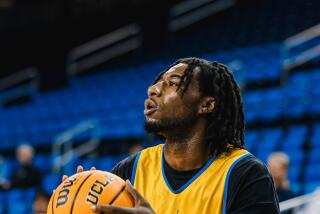UCLA Standout Lee Has a Family Among Bruins
- Share via
In the last three years, Jong-Min Lee has lost his parents, moved to the United States from South Korea, been denied admission to the college he wanted to attend before finally being admitted this year and lost his desire to return to his home country.
Yet Lee, using tennis as therapy and the memory of his parents as motivation, has become a key part of the top-ranked UCLA men’s tennis team, which begins play in the NCAA championships Saturday at Athens, Ga.
The loss of Lee’s parents, particularly his father, Ki-Chul, has brought the team closer. The Bruins have become a surrogate family for Lee, whose only remaining family member is a sister 10 years older who still lives in Korea.
Lee’s mother, Sung-Hee Choi, died after a long battle with cancer 1 1/2 years ago. Then his father suffered a stroke in December and died in late January.
“Because of the economic crisis, he was under a lot of stress,” Lee said of his father, who was 64 when he died. “The stress just caught up to him and he had a stroke.”
Lee visited his ailing father in Seoul over Christmas break and returned to school in January. His father died a week later.
Lee was devastated by news of his father’s death.
“In the beginning it was hard to play,” he said the effect on the court. “I’d be in a match, then just lose my concentration. It was like I was on another planet.”
Off the court, Lee was without any family for support, alone with a group of players he hardly knew.
But the incident served as a chance for the team to grow together.
“It was really hard news for all of us,” said Jean-Noel Grinda, UCLA’s top-ranked player. “We heard when we were having our first team meeting. It was supposed to be an initiation for all the new guys.”
Instead, it became the first of many nights the team rallied around Lee.
“We tried to be a family to him,” Grinda said. “Each of us tried to have our quality time with him. He slept at my place a few nights.
“It was the least we could do and at the same time all we could do.”
And Lee appreciated it.
“I knew everybody was there for me,” he said. “When I asked for help on anything, they were there for me. That’s why I’ve handled it as well as I have.”
And the time together also helped make the team the best in the nation.
The Bruins (23-2) face No. 54 Virginia Tech (22-6) in the round of 16 Saturday. With a victory the Bruins would play the winner of the match between ninth-ranked Florida and 10th-ranked Southern Methodist in the quarterfinals Sunday.
Last year the Bruins were beaten in the quarterfinals by Stanford. This year, Coach Billy Martin expects his team to go much farther, and one of the biggest reasons is Lee.
“He’s our best doubles player and a great contributor in singles,” Martin said. Martin’s father died two years ago, which helped him relate to Lee through the beginning of this year. “I think he could easily be in the top 10 in the world in doubles one day.”
Born in Seoul, Lee began taking tennis lessons at 8. When he was 11, he was sent to Australia to develop his game with a coach he met at a camp in Seoul.
He became one of the top juniors in the world, winning the 1995 Australian and U.S. Open junior doubles titles when he was 18.
He also played on his country’s Davis Cup team in 1996 and was a member of the Korean Olympic team in Atlanta.
But he couldn’t get into UCLA after high school. Instead, in the summer of 1996 while Lee was living in Australia, Martin referred him to UC Santa Barbara, with the plan that he would be released from his scholarship after two years if he could meet UCLA’s academic standards. He did, and this year he and Grinda have become the nation’s sixth-ranked doubles team.
The time Lee has spent this past season on his game has not only made him a better player, but what he credits with helping him get over his parents’ deaths.
“It hasn’t sunk in because I’m in the United States playing,” he said. “If I were in Korea, it’d be tougher. I’ve been away from the issues, and that’s helped me to deal with it a little bit.
“Right now, I don’t have time to reflect or think. I have to focus on our goals as a team. So I’m scared a little of what will happen when the season’s over, and I’ll have more time to reflect.”
He still keeps in touch with his sister, and is trying to persuade her to to move to the United States.
He says he doesn’t want to return to his native country, but he hasn’t forgotten Korea.
“Since I’ve lost my parents, I’ve thought of all the sacrifices they made for me and I want to be the best player I can be and see how far I can go.”
More to Read
Go beyond the scoreboard
Get the latest on L.A.'s teams in the daily Sports Report newsletter.
You may occasionally receive promotional content from the Los Angeles Times.






